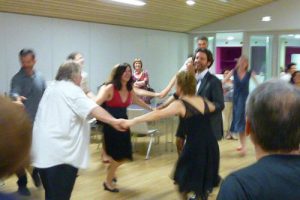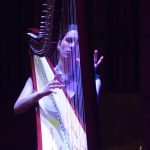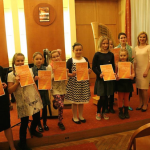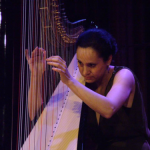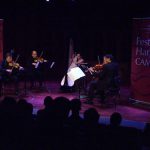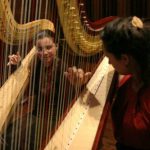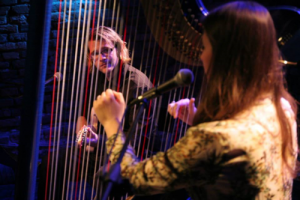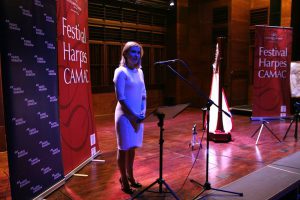Camac Blog
Competition has been shown to be useful…
News
July 12, 2015
…up to a certain point, and no further”, Franklin D. Roosevelt went on, “but cooperation, which is the thing we must strive for today, begins where competition leaves off.”
People vary in the extent to which they relish competitions. Having been useless at them myself, I regard their winners with great admiration and awe, and I also really feel for everyone who gets thrown out. I promise you that in the fullness of time it will cease to matter, but it’s always very hard at the time.
A wise course of action in the bloody aftermath of first round results is to join Germaine Lorenzini for a cigarette in the fresh air, and this was where I found myself at the last Cité des Arts competition. “It’s a horrible process sometimes, isn’t it”, I said, mournfully. “Of course it’s a horrible process”, said Germaine, “but we have no other solution. You can’t achieve the constructive aspects of a competition in any other way. There’s no better way to push your level, train your nerves, handle pressure. So we have to keep doing them.”
And so, as we explain in the sponsoring section of camas-harps.com, we keep doing competitions. They are important, and to win one is an incredible achievement which should be celebrated far and wide. Nonetheless, festivals are more fun.
We have just returned from the Second Cracow Harp Days, and they have been a perfect example of why we love festivals. Interesting, diverse, and warm, organised in friendship and with a passion for the harp and the artists who play it, the weekend was a joy from start to finish.
We began with a celebration of young Polish talent: a lunchtime recital by Klara Woskowiak, co-winner of the Camac competition in London in 2014. If you were unlucky enough to miss it, you can enjoy a film of the entire concert on TV Zaprasza, one of the festival’s national patrons.

- Klara Woskowiak. Photo : C.K. Derdacki
- Master classe pour les élèves de l’école de musique, avec Klara Woskowiak
- Florence Sitruk, Cracovie. Photo : C.K. Derdacki
- Florence Sitruk, Čiurlionis Quartet. Photo : C.K. Derdacki
- Master classe pour les jeunes harpistes professionnelles avec Florence Sitruk
Saturday night welcomed another classical recital, by Florence Sitruk with the Čiurlionis Quartet, her colleagues from Lithuania. Among her many other distinguished activities, Florence is currently Visiting Professor of the Academy of Music in Cracow. Another thing that we particularly value in festivals, is their capacity to bring different ages and stages, and different fields of experience together. A city’s academy can work with its music schools; a young professional can give school-age harpists the direct benefit of their experience, inspiring them in ways that are all the more intense, because they are not remote.
On Sunday, we decamped to Alchemia, one of Cracow’s famous jazz clubs, for blue harp and guitar with Tara Minton and Tristan McCoppin. Tara is no stranger to Harpblog’s pages, and her new combination of blue harp with Tristan McCoppin’s sensitive e-guitar was delicate and ear-catching. We are very proud of Tara – not that we own her, but we have helped her acquire a blue harp. When it comes to artist sponsorship, as harp makers we do our best to be active! But we are not managers, and it would be dishonest to pretend we are. A sponsorship project has come out right when we have been able to help catalyse something that the artist transforms and continues to transform into something amazing, themselves.
With the exception of the occasional events we organise completely ourselves (like the Camac festivals, at home in France), one thing that festivals and competitions have in common is how much their success depends on their in situ organisers. We could not have wished for a better partner for the Dni Harfy w Krakowie than Agnieszka Grela-Fedkowicz. A harp festival in Cracow is her vision – to open new doors for her pupils and other young harpists, to draw Cracow’s attention (famed cultural centre as it is) to the harp, and to capitalise on the possibilities afforded by her music school’s splendid new buildings. It was also great to see the support given to Agnieszka by her harpist colleagues who came from far and wide to attend the days, from her director Marta Nowaczyk-Łapińska at the Szkoła Muzyczna I i II stopnia im. B. Rutkowskiego, from her cultural patrons from the city of Cracow, and also from the school’s pupils and their parents. One family provided delicious cakes; another the flowers – all these contributions are the opposite of trivial. A festival is about everyone working together to celebrate music, and this is where the beautiful atmosphere comes from. It is possible to programme a competition as part of a festival, as a goal and motivation for students. It is however completely impossible to run a good festival in a darker spirit of competition. A festival does not and indeed cannot exist for one person, to inflate one ego. Its very existence depends on many, sparked by an artistic director with the vision to create something for everyone.
The global musical marketplace is overcrowded and this can give rise to the idea that one must compete with one’s colleagues. But even if this idea were not unpleasant, in music it doesn’t even work. If you decide to get more work by financially undercutting your colleagues, what happens is that you price everyone out of a living – including yourself. If you don’t help your colleagues, by passing on work or by supporting their events, if you deliberately schedule other happenings to clash with theirs, all that happens is that each event is smaller – including yours. Practise solidarity, and for whatever reason everyone is better off, even in difficult times.
In the spirit of serving many, and seeing as we were driving halfway across Europe to get to Cracow, we also went to Wroclaw, Warsaw, Poznan and Szczecin for regulations. All in all, we drove five thousand km and regulated nearly a hundred harps. As Jakez and Enric rubbed their aching backs, I comforted them from the comfiest section of the van passenger seat that it was nice to feel useful, and as they had made such good time, extra harps had been added to the schedule. We were busy, certainly – and also exhilarated. We are still buoyed up by the wonderful festival, and touched beyond measure by the work, care and joyful music-making from Agnieszka and her team.

